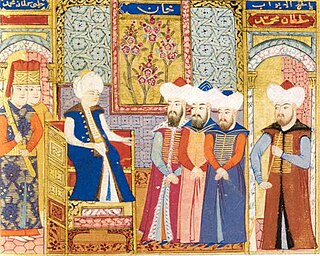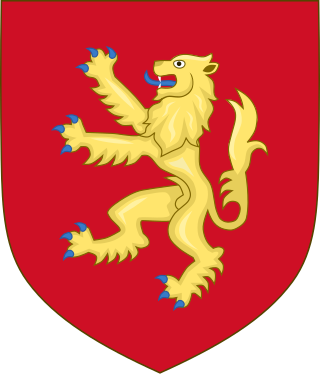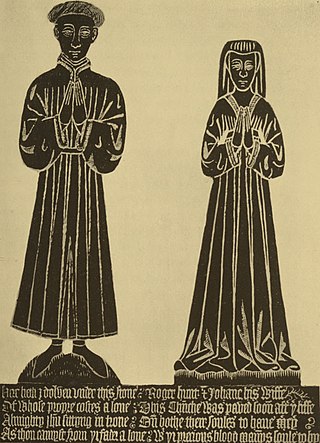Related Research Articles

Mehmed I, also known as Mehmed Çelebi or Kirişçi, was the Ottoman sultan from 1413 to 1421. The fourth son of Sultan Bayezid I and Devlet Hatun, he fought with his brothers over control of the Ottoman realm in the Ottoman Interregnum (1402–1413). Starting from the province of Rûm he managed to bring first Anatolia and then the European territories (Rumelia) under his control, reuniting the Ottoman state by 1413, and ruling it until his death in 1421. Called "The Restorer," he reestablished central authority in Anatolia, and he expanded the Ottoman presence in Europe by the conquest of Wallachia in 1415. Venice destroyed his fleet off Gallipoli in 1416 as the Ottomans lost a naval war.

Richard Fitzalan, 4th Earl of Arundel, 9th Earl of Surrey, KG was an English medieval nobleman and military commander.

Sir Robert Tresilian was a Cornish lawyer, and Chief Justice of the King's Bench between 1381 and 1387. He was born in Cornwall, and held land in Tresillian, near Truro. Tresilian was deeply involved in the struggles between King Richard II and the Lords Appellant, and was eventually executed for his loyalty to the king.

William Bonville, 6th Baron Harington was an English nobleman who was a loyal adherent of the House of York during the dynastic conflict in England in the 15th century now known as the Wars of the Roses. He was slain and left dead on the field during the Yorkist defeat at the Battle of Wakefield, leaving his baby daughter, Cecily Bonville heiress to his barony.
Sir Walter Beauchamp was an English lawyer who was Speaker of the House of Commons of England between March and May 1416.

Roger Hunt was an English MP and Speaker of the House of Commons.
William Dalderby was an English politician. He was a Member (MP) of the Parliament of England for Lincoln from October 1383 and January 1404. William, the second son of Robert Dalderby, prospered in the wool trade. In September 1378, William became bailiff of Lincoln, and soon thereafter he received his first royal commission. During his year in office in 1383 as MP, his term was uneventful.

John Burley was an English lawyer, soldier, and a knight of the shire (MP) for Shropshire six times from 1399. He was a justice of the peace for Shropshire and sheriff of the county from 10 December 1408 – 4 November 1409. A key member of the Arundel affinity, he helped muster forces to combat the Glyndŵr Rising and died a short time after accompanying Thomas Fitzalan, 12th Earl of Arundel on Henry V's first expedition to France.
Sir Otto I Bodrugan, his name often written at the time as Otes, was an English landowner, soldier and politician from St Goran in Cornwall.

Sir Thomas Brooke (c.1355-1418) of Holditch in the parish of Thorncombe in Devon and of la Brooke in the parish of Ilchester in Somerset, was "by far the largest landowner in Somerset" and served 13 times as a Member of Parliament for Somerset. He was the first prominent member of his family, largely due to the great wealth he acquired from his marriage to a wealthy widow. The monumental brass of Sir Thomas Brooke and his wife survives in Thorncombe Church.
Edward Guildford (c1390-1449) was an English landowner, administrator, and politician from the county of Kent who served three times as its MP and once as its Sheriff.
Robert Andrew was one of the two Members of Parliament for Ipswich in 1391 and possibly 1393.
John Bernard, was from Akenham, near Ipswich, Suffolk, England. He was a merchant, and one of the two Members of Parliament for Ipswich in January and September 1397, 1407 and 1411.
William Debenham was a Member of Parliament and a merchant. His years of birth and death are unrecorded.
John Lewe was one of the two Members of Parliament for Ipswich in 1399. His dates of birth and death are unrecorded.
John Felbrigg was one of the two MPs for Ipswich in 1407.
John Rous was one of the two MPs for Ipswich in 1410 and November 1414. He was a merchant in the Staple of Calais and was survivied by his widow, Joan.
James Andrew was one of the two MPs for Ipswich in a variety of English Parliaments from 1410 to December 1421.
William Debenham was one of the two MPs for Ipswich in a number of English parliaments from November 1414 to 1437.
William Weathereld was one of the two MPs for Ipswich in the English parliaments of December 1421 and 1429 and possibly the parliament of 1447.
References
- ↑ K.N. Houghton (1993). "MASTER, William, of Ipswich, Suff.". In Clark, Linda; Rawcliffe, Carole; Roskell, J. S. (eds.). The House of Commons 1386-1421. The History of Parliament Trust. Retrieved 6 November 2022.
- ↑ http://www.historyofparliamentonline.org/volume/1386-1421/member/master-william